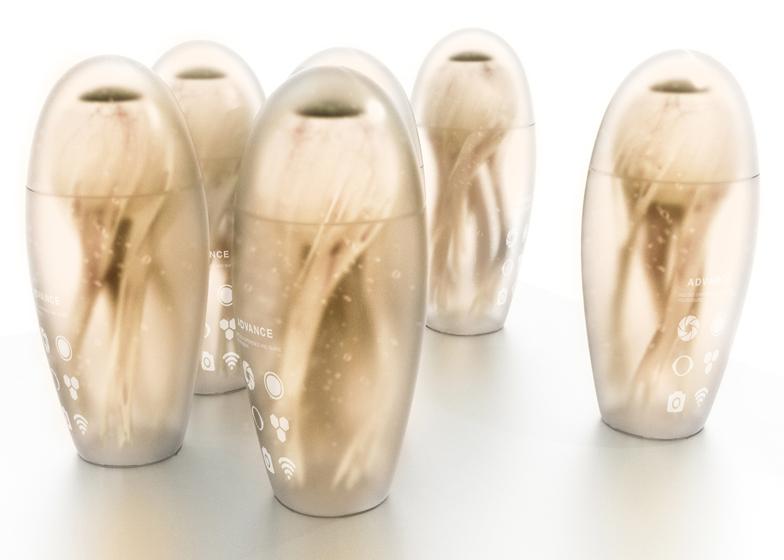Italian research studio MHOX has unveiled a concept to allow people to swap their eyes with digital-compatible versions.
Following Will.i.am's call for an ethical stance on 3D-printing humans, MHOX has shared its futuristic vision for a set of synthetic printed products branded EYE (Enhance Your Eye), which would prevent blindness, sharpen and filter sight, and connect the eye to Wi-Fi for recording and sharing visual experiences.
"Latest developments in bioprinting and biohacking let us imagine that in the near future it would be possible to easily print organic, functional body parts, allowing the human to replace defected districts or enhance standard performance," said MHOX partner and lead designer Filippo Nassetti.
"This project is based on the idea of augmenting the sight sense, increasing the functionalities of the eye with ones currently handled by other body segments or external devices," he added.
The studio has been working on the conceptual project for the last year but released the details in response to music producer Will.i.am's controversial comments about 3D-printing humans during an interview with Dezeen earlier this month.
"While in our opinion the 3D-printing of full human beings is still a far reach vision, at least for technical reasons, we believe that the 3D bioprinting of functional parts and replacements is a contemporary issue that designers have to start addressing," Nassetti told Dezeen.
In MHOX's scenario, subjects would first undergo an operation to remove their natural eyes and insert a new organic component called the deck into their heads. This would act as a permanent connection point between the muscle fibres of the synthetic eye and optical nerves in the brain, allowing new eyes to be swapped and upgraded like electronic devices.
"We envision that the link between the deck and the EYE will be based on attractive forces between the tissues more than mechanical joints," said Nassetti. "To replace the EYE the user only has to put it in position inside the skull, and the tissues of the Deck and the EYE connect automatically."
MHOX proposes three synthetic eyes for different purposes, each formed from a 3D printer using "bio-ink" containing the different cells need to recreate human tissues. The printer would be able to switch between different types of bio-ink to lay down combinations of cells, eventually building up into full organs such as eyes.
The first product, called EYE Heal, simply replaces the natural eye with a printed version that has the same capabilities, for cases of sight deterioration, disease or trauma.
"Additionally, it is possible to preserve or change the retinal morphology and accordingly the identity of the user," Nassetti said.
Taking this a step further, the EYE Enhance product would include a "hyper-retina" that enables sharper vision than the 20/20 visual acuity considered "normal" in humans.
A gland incorporated into the synthetic eye would also aesthetically filter visual signals when activated by enzymes in specially developed pills. Swallowing different pills could allow the brain to process the images as black and white, sepia-toned or through one of the various filters offered by photo-sharing platform Instagram.
The final model is EYE Advance, which would offer direct connectivity with Wi-Fi enabled devices.
Again using an orally ingested pill, a gland in the optic nerve that supports Wi-Fi communication would be triggered by enzymes. Once activated, images captured by the synthetic eye could be transferred directly to a smartphone or tablet as a live stream or as video clips.
Projecting current advances in bioprinting technology, MHOX envisages that the EYE products could be available by 2027.
"This project is a concept design based on an intuitive vision of how existing technologies might evolve," said Nassetti. "We forecast that bioprinting and biohacking would have made impressive advances by 2027."
"Moreover, often in the past design fiction has pushed the interest on possible technological evolution, leading the way to new technological developments and connected ethical debate," he continued. "We like to think of this project as a small step in that direction."
The research studio proposed the EYE project to spark debate about the possibilities these new technologies could create.
"We tried to craft a future vision that hopefully would find both enthusiasm and disgust, since it implies a substantial revision of our current body perception," Nassetti said. "Also we believe it challenges the contemporary concepts of natural and synthetic. Most of all we hope this project would bring awareness and cultural exchange on the potential and risks of future bio-products."

